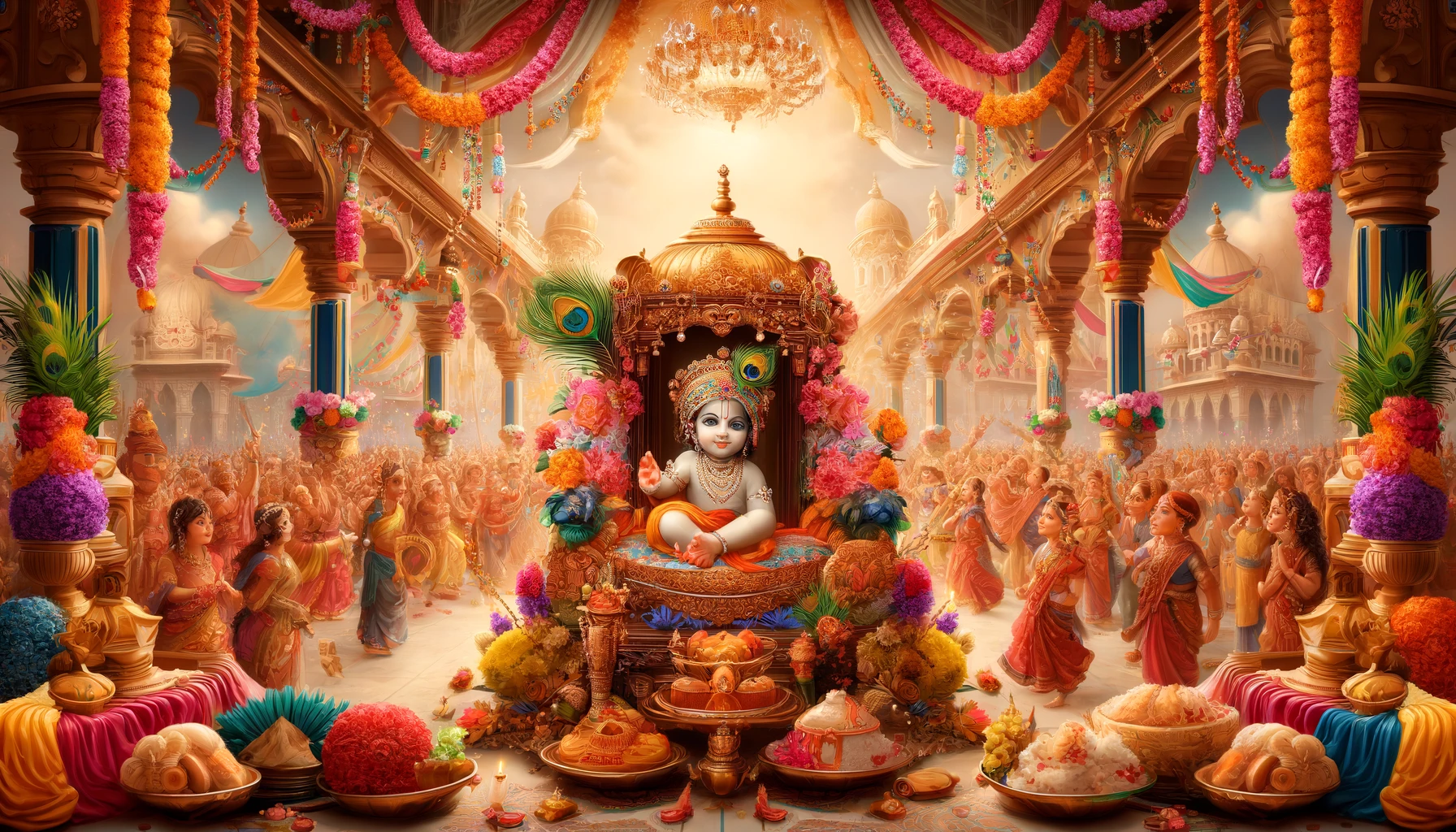
- This event has passed.
Janmashtami
August 26

Janmashtami, the annual Hindu festival, marks the birth of Lord Krishna, an avatar of the god Vishnu. Celebrated with great devotion and enthusiasm across India and among Hindu communities worldwide, this festival encapsulates the rich cultural and spiritual tapestry of Hinduism. The festivities reflect deep-rooted traditions, telling the story of Krishna’s birth and his early life, which is filled with miraculous events and profound teachings.
The festival occurs on the eighth day (Ashtami) of the Krishna Paksha (dark fortnight) in the month of Shravana or Bhadrapad. Depending on the lunar calendar, this typically aligns with August or September of the Gregorian calendar. Devotees observe Janmashtami through fasting, singing, praying, and enacting various rituals that symbolize Krishna’s life events, emphasizing the importance of good overcoming evil.
History and Meaning
The legend of Krishna’s birth is an intriguing narrative of survival and divine intervention. Born at midnight in the dense jail of King Kansa in Mathura, Krishna’s life was in jeopardy from the moment of his birth. His uncle, King Kansa, was prophesied to be killed by his sister Devaki’s eighth son. To protect him, his father Vasudeva carried him across the Yamuna river to Gokul, where he was raised by his foster parents, Yashoda and Nanda.
The significance of Janmashtami lies in its representation of hope, the victory of faith over fear, and the triumph of good over evil. Krishna, throughout his life, demonstrated qualities of divine love, compassion, and the pursuit of justice, which are celebrated and remembered during this festival. His teachings, later compiled in the Bhagavad Gita, continue to inspire millions to follow a righteous path in life.
Traditions and Rituals
Janmashtami is celebrated with a variety of rituals that are rich in symbolism and tradition. One of the most significant rituals is the re-enactment of Krishna’s journey from Mathura to Gokul, known as Dahi Handi in Maharashtra, where youths form human pyramids to break an earthen pot hung high above the ground. This pot represents the universe, and the act symbolizes Krishna’s playful and mischievous side, as he would often steal butter stored in similar pots.
Another common practice is the decoration of temples and homes with scenes from Krishna’s early life, including his birthplace. Devotees also perform Raslila to depict important episodes from Krishna’s life, which are theatrical performances combining elements of folk music, dance, and drama. These rituals not only recreate the historical and cultural context of Krishna’s time but also impart moral lessons relevant to contemporary life.
Modern Celebration
In contemporary times, Janmashtami has transcended geographical boundaries, becoming a global celebration among the Hindu diaspora. In India, cities like Mathura and Vrindavan host week-long festivities, attracting devotees from all over the world. The rituals have adapted to modern contexts, with live broadcasts, online prayer meetings, and virtual reality experiences of the holy sites becoming increasingly common.
Outside India, Janmashtami is celebrated in countries like the USA, UK, Canada, and parts of Southeast Asia, where Indian communities are significant. These celebrations include parades, dance performances, singing of bhajans, and distribution of prasadam, ensuring that the essence of the festival remains intact even in a foreign land. This adaptation to the modern world highlights the universal appeal and enduring relevance of Janmashtami’s messages.
10 Congratulations and Wishes
- May Lord Krishna’s flute invite the melody of love into your life this Janmashtami.
- Wishing you and your family a blessed Janmashtami filled with joy, happiness, and devotion.
- May the natkhat Nandlal always give you many reasons to be happy.
- Let’s celebrate the birth of Lord Krishna with full fervor and enthusiasm.
- May Krishna’s blessings bring you good fortune and prosperity in your life.
- Celebrate the day with peace, love, and bliss. Have a blessed Janmashtami!
- May you find your love on this Janmashtami and Gopis steal your worries.
- May the divine tunes of Krishna’s flute fill your life with eternal joy.
- Happy Janmashtami! May Lord Krishna shower his blessings upon you and your family.
- On this auspicious day, may your life be filled with the blessings of Krishna and you lead a peaceful life.
10 Unusual Facts
- Lord Krishna is considered the eighth avatar of Vishnu and was born in a prison.
- The number eight is significant in his life, as he was the eighth child of his mother, Devaki.
- Janmashtami is also known as Gokulashtami, Krishnashtami, and Sree Jayanti.
- The Bhagavad Gita, a 700-verse Hindu scripture, is a conversation between Prince Arjuna and Krishna, who serves as his charioteer.
- Krishna’s teachings and life events have influenced many other religions and inspired numerous philosophical debates.
- Dahi Handi celebrates Krishna’s playful and mischievous side and involves teams competing to break pots filled with yogurt or butter.
- It is one of the few festivals that is observed during the night time, reflecting the time when Krishna was born.
- In Manipur, Janmashtami is celebrated with the dance form ‘Raslila’, which is a major cultural event.
- Krishna’s favorite food is believed to be butter, and during Janmashtami, foods made from milk and curd are predominantly featured.
- Mathura and Vrindavan attract over a million pilgrims during the Janmashtami festival each year.
10 Frequently Asked Questions
- What is Janmashtami?
- Janmashtami marks the birth of Lord Krishna, celebrated with great enthusiasm by Hindus worldwide.
- Why do people fast on Janmashtami?
- Devotees fast as a mark of devotion and respect to Lord Krishna, reflecting his teachings and sacrifices.
- How is Janmashtami celebrated?
- It involves various rituals like singing, dancing, praying, fasting, and enacting scenes from Krishna’s life.
- What are some traditional foods prepared on Janmashtami?
- Foods like Dhaniya Panjiri, Butter, and Milk sweets are traditionally prepared, reflecting Krishna’s favorites.
- What is Dahi Handi, and why is it celebrated?
- Dahi Handi commemorates Krishna’s playful and mischievous behavior of stealing butter; it involves breaking a high-hung pot filled with buttermilk.
- Can non-Hindus participate in Janmashtami celebrations?
- Absolutely, Janmashtami is celebrated by people of various faiths interested in experiencing and respecting Hindu cultural traditions.
- What is the significance of the midnight celebration on Janmashtami?
- Krishna was born at midnight, and thus, the main festivities occur at that time to align with his birth hour.
- What is Raslila and its importance in Janmashtami?
- Raslila is a theatrical enactment of Krishna’s life, especially his childhood, which is performed to convey his divine play (leelas).
- How do modern celebrations of Janmashtami differ from traditional ones?
- Modern celebrations often include online streaming of rituals, social media engagements, and global participations.
- Why is Janmashtami celebrated with such devotion in India?
- Krishna’s teachings and his role in the Mahabharata have a profound impact on Indian culture and spirituality, making this festival deeply significant.
Janmashtami not only commemorates the birth of a deity but also celebrates the enduring legacy of his teachings. The festival serves as a spiritual reminder of the virtues like faith, love, and compassion that Lord Krishna espoused. It is a time for reflection, devotion, and joyous celebration, bringing together communities in a shared reverence for one of Hinduism’s most cherished figures.
Why This Day Is Important
Janmashtami provides a profound connection to cultural heritage and spiritual values that are central to Hindu philosophy. It reinforces moral values through the narratives of Krishna’s life, making the festival a timeless link between past and present, guiding devotees towards living a life of virtue and righteousness.
Author’s Opinion
The universal themes of love, justice, and divine play that Janmashtami embodies are not only relevant to Hindus but to anyone seeking to understand the essence of devotion and the importance of righteousness. This festival’s ability to adapt to modern times while preserving its traditional roots is a testament to its enduring appeal and significance in fostering a more compassionate and understanding world.




